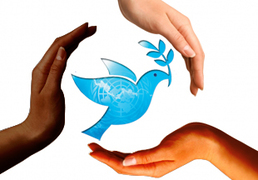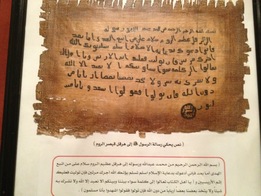
Religious leaders gathered at the same time as the political leaders. While hundreds of thousands demonstrated in the streets of New York thirty religious leaders from 21 countries on 6 continents gathered for prayer in which they called for concrete actions to curb carbon emissions. “if we change, everything changes. So we have to commit ourselves,” said Rabbi Abraham Soetendorp. For most of us this commitment and change is in small ways, hoping and believing that we can contribute to the well - being of our planet. But how hard it is for most of us to give up our cars, to simplify our lives. While it is important for religious leaders to speak out in a show of unity and concern, a little voice inside can't help think that by traveling to New York they were in their own small way contributing to carbon emissions.
The Jesuit highlighted in this month's Jesuit calendar is someone who raised awareness about the importance of creation. Henri de Lubac lived through most of the 20th century. He fought in the French resistance and knew first hand the horrors of war. He was a friend of Teilhard de Chardin and so was aware of new developments in science, particularly in the field of evolution. His desire, like many other theologians of his time, was for a theology which spoke to people's reality and like other theologians he was silenced during the 1950s as the institution of the Church couldn't quite catch up with development and new thinking. His theology, however, bore fruit and is evidenced in the documents of the Second Vatican Council.
Henri de Lubac believed that Creation is a book in which God is revealed. He said " the first language God uses to communicate to me is Creation. Being created by the Word, everything which comes from Him is a Word and speaks of Him. It is for me to listen and answer - but the initiative is not mine." If we were to truly listen to creation what would we hear? Well we might hear that we are an intimate part of it. We have all evolved from that singularity which started the whole process of life. If we had a film of our universe's life and we were to play it back, we would all end up at that beginning point, indistinguishable from one another. We have come from the same source which is a teaching of all religions but we forget so easily our interrelatedness with all of creation and one another. As beings who have evolved to a level of consciousness which is unique among other creatures we have the capacity to determine our future growth. We have the freedom to determine our future. it's in our hands and yet we pay lip service to it while continuing to wage war and exploit the earth's resources for our own end. In the gospels Jesus tells us that people will hear and will not understand. This basic truth of interrelatedness has not reached down into our souls and psyches. It has not become part of the air we breathe. For this we need a spiritual and religious practice. Each day we need to remind ourselves that we are children of the universe, part of a great web, interconnected with all life. We could do no better than making our daily prayer that attributed to Chief Seattle but really, I believe, written by Ted Perry and adapted by me!:
"All things are connected. Whatever befalls the earth befalls the children of the earth. I do not weave the web of life; I am merely a strand of it. Whatever I do to the web, I do to myself.





 RSS Feed
RSS Feed
